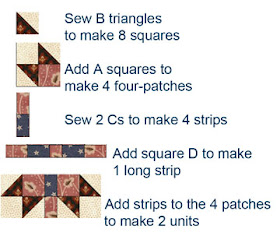New England Block by Becky Brown
Louisa May Alcott
She lived with her family in a ramshackle house in Concord, Massachusetts, and kept in touch with an old friend Alfred Whitman, a neighbor who had moved to Kansas with his father to support the antislavery cause. Although she hated to sew, she spent April making shirts for soldiers.
May 19, 1861 Concord Massachusetts, Dear Alf
If I had not been sewing violently on patriotic blue shirts for the past month I should have written… I lay down my needle and take up my pen with great inward contentment, the first article being my abomination & the last my delight.
Of course the town is a high state of topsey turveyness, for every one is boiling over with excitement & when quietdoes get stirred up it is a sight to behold. Concord
Concord 100 years ago
All the young men & boys drill with all their might, the women & girls sew & prepare for nurses, the old folks settle the fate of the Nation in groves of newspapers, & the children make the streets hideous with distracted drums & fifes. Everyone wears cockades wherever one can be stuck,
A selection of Civil War era cockades
The Union examples tend to be red white and blue.
The Confederate cockades seem to have been just one color, red, white or blue.
Louisa continued....
Flags flap over head like parti colored birds of prey, patriotic balmorals, cravats, handkerchiefs & hats are all the rig, & if we keep on at our present rate everything in heaven & earth will soon be confined to red white & blue…
Concord was not alone in it's excitement over the patriotic colors.
The New England Block has several names. This name was assigned by a 1930s pattern company called Needlecraft Supply.The oldest name seems to be 4X Star. The original (BlockBase #1802a) was based on a grid of 5, but a slightly narrower center strip works better for an 8 inch block.
Cutting Instructions for an 8" Finished Block
A Cut 4 light and 4 medium squares 2-1/4"
B Cut 4 dark and 4 light squares 2-5/8". Cut each in half with a diagonal to make 2 triangles. You need 8 triangles of each
C Cut 4 medium and 4 light rectangles 1-1/2" x 2-1/4".
D Cut 1 medium square 1-1/2"
Click here to see a sale at Cowan's Auctions of cockades and Civil War jewelry.
If you are inclined to sew a cockade for a re-enactor you might find these pictures from an old millinery book useful. It's all in the pleating and gathering.
http://books.google.com/books?id=xHbaFO0ow3kC&dq=little+women+louisa+alcott&source=gbs_navlinks_s
UPDATE May 24, 2011
A commenter asked about the source for the quote above
It's on page 64 of The Selected Letters of Louisa May Alcott, edited by Joel Myerson and Daniel Shealy. This is the most comprehensive volume of LMA's letters although there are other versions, including a 19th century volume avaliable to read on line
http://www.archive.org/details/louisamay00alcorich














I'll be working on my block later today, but I'm very intrigued by the cockade pages - would you be willing to share the source?
ReplyDeleteYour LMA post is appreciated. Having worked in Concord, MA for over 35 years, I am connect with the history and your photos, our Jo's Little Women Club plans to visit Orchard House soon and a Civil War sewing circle is in the works at my favorite quilt shop. The New England Block is very pleasing. Thanks again.
ReplyDeleteHere's the PDF I found on how to for cockades:
ReplyDeletehttp://images.library.wisc.edu/HumanEcol/EFacs/MillineryBooks/MBAnslowPractical/reference/humanecol.mbanslowpractical.i0017.pdf
Rather than Little Women you should read "Hospital Sketches". Alcott worked as a nurse during the Civil War and later published a novella based on that time. Few people know that Alcott wrote anything other than young adult fiction. Her work in suspense/thrillers, what most people call her "alternative" writing, is fascinating.
ReplyDeleteThank you for your fidelity in keeping up this blog.
ReplyDeleteI have been in Louisa Mae Alcott's home and if it is ramshackle, mine could only qualify as a tent...
Sharyn
Thank you so much for 20 wonderful weeks of Civil War history and blocks. I just loved Louisa's letter, I guess I have never been sewing violently.:)
ReplyDeleteLoved the pictures and stories that accompanied this week's block. My block is completed and on my blog along with a how-to.
ReplyDeletehttp://lillianscupboard.wordpress.com/2011/05/15/civil-war-quilt-block-20-new-england-block/
What is the source of Alcott's quote you cited? I am interested in reading the book from which it came.
ReplyDelete